牛津初中9B unit3 reading知识点
译林牛津九年级unit3知识点
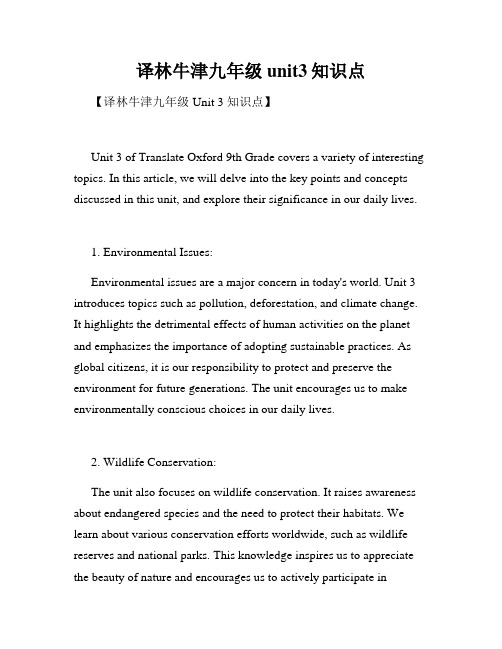
译林牛津九年级unit3知识点【译林牛津九年级 Unit 3 知识点】Unit 3 of Translate Oxford 9th Grade covers a variety of interesting topics. In this article, we will delve into the key points and concepts discussed in this unit, and explore their significance in our daily lives.1. Environmental Issues:Environmental issues are a major concern in today's world. Unit 3 introduces topics such as pollution, deforestation, and climate change. It highlights the detrimental effects of human activities on the planet and emphasizes the importance of adopting sustainable practices. As global citizens, it is our responsibility to protect and preserve the environment for future generations. The unit encourages us to make environmentally conscious choices in our daily lives.2. Wildlife Conservation:The unit also focuses on wildlife conservation. It raises awareness about endangered species and the need to protect their habitats. We learn about various conservation efforts worldwide, such as wildlife reserves and national parks. This knowledge inspires us to appreciate the beauty of nature and encourages us to actively participate inconservation initiatives. By understanding the fragility of ecosystems, we develop a sense of empathy towards all living creatures.3. Historical Events:In Unit 3, we explore significant historical events that have shaped the world we live in today. From the French Revolution to the Industrial Revolution, we delve into the causes, consequences, and key figures involved in these transformative periods. Through these historical narratives, we gain a deeper understanding of the societal, economic, and political developments that have brought us to the present day. We realize the value of learning from the past to create a better future.4. Literary Analysis:Unit 3 also delves into the realm of literature, introducing us to classic and contemporary works. We engage in literary analysis, exploring themes, characters, and symbolism. By interpreting and critically analyzing texts, we develop our ability to think critically and communicate effectively. Literature expands our imagination and broadens our horizons, enabling us to empathize with diverse perspectives and ideas.5. The Power of Language:Language plays a central role in Unit 3. We explore how language can shape our society and influence our perception of the world. Through discussions on media and advertising, we examine how language can be used to manipulate opinions and reinforce societal stereotypes. We are challenged to become discerning consumers of information, questioning the messages conveyed through language and media.6. Cultural Diversity:Unit 3 celebrates the richness of different cultures and emphasizes the importance of cultural diversity. We learn about different customs, traditions, and rituals from around the world. By appreciating cultural diversity, we broaden our understanding of the global community and nurture respect for different perspectives. This knowledge enables us to become more empathetic and open-minded individuals.In conclusion, Unit 3 of Translate Oxford 9th Grade introduces us to a range of thought-provoking topics. From environmental issues to historical events, literature, language, and cultural diversity, each theme offers valuable insights that expand our knowledge and shape our worldview. By engaging with these concepts, we develop critical thinking skills, empathy, and a sense of global citizenship. Through ourlearning in Unit 3, we are empowered to create positive change in the world around us.。
牛津英语9BUnit 3 Reading
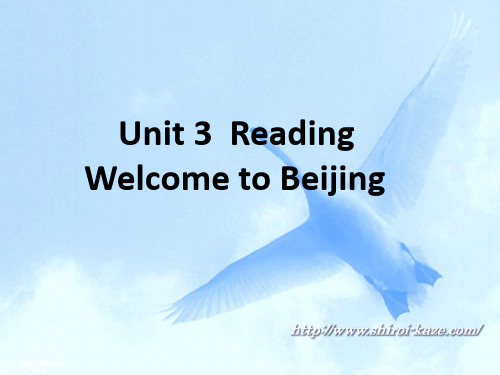
Read and answer:
1.Where is Guilin?
It is in the south of China, and it lies on the two sides of Li River .
2.What is Guilin famous for?
mountains in different shapes. underground caves rocks in strange shapes. Li River 3.How can you visit Guilin?
More exercise
3. The emperors of the Ming and Qing dynasties used to live here. (line10) used to do sth. : often did something in the past His father used to smoke after supper. The boy used to be late for school.
Line21:the Summer Palace Line22:Chinese—style Line23:landscape Line26:consist of… Line26:mainly Line27:man—made Line28:pagoda Line31:ancient times Line32:border Line33:wonder Line33:experience Line34:greatness Line34:tiring Line 34:step by step
be/get used to doing sth. :
I am used to getting up early.
牛津英语9B Unit3 单元复习

一、翻译下列词组1. 在中国北部2. 中国的首都3. 容易迷路4. 在北京的中心5. 被建筑物的美丽设计所吸引6. 挤满游客7. 观看升旗仪式8. 一座著名的中国式园林9. 由……构成10. 一座人造湖11. 由石头和砖块建成12. 在古时候13. 世界上的奇迹之一14. 领略它的瑰丽和宏伟15. 一步步地爬长城16. 从公共汽车站租一辆自行车17. 在河的两岸18. 亲眼目睹……19. 绕着城市骑车20. 坐船旅行二、根据句意及中文提示完成下列句子1. Y ou must be careful and don't make the same mistake (一直).2. How often should my car need (检查)?3. The teacher (根本不满意) my composition.4. If you don't like your new robot, you can (要回你的钱).5. I hope you can (试用一下新的电脑).6. We expect the robot exhibition to (至少持续两周时间).7. I think you should (更多地注意) your orders.8. Please put my books on my desk (连同) my bag.9. I (期望着尽快收到你的来信) soon.10. My robot will (洗刷和弄干餐具) after each meal.11. We (很遗憾地听到) that you are unhappy with your TV.12. I'm very busy, so I have no time (回复他的电子邮件).13. Will you please help me (清理杂物) in my sitting room?14. I don't know (出了什么毛病) my clock.15. I think I (我自己能做好一切事情).三、句子翻译1. 你知道机器人展览下周是否在我市举办?Do you know if the robot exhibition ?2. 有台机器人是为帮助学生做作业设计的。
初中英语九年级上册(牛津译林版)Unit3Reading教学设计

一、教学目标
(一)知识与技能
在本章节的教学中,学生将通过阅读牛津译林版初中英语九年级上册Unit 3的Reading部分,掌握以下知识与技能:
1.掌握本节课的核心词汇和短语,如“goal, dream, achieve, effort, give up, encourage, confident”等,并能熟练运用这些词汇进行口语表达和书面写作。
3.阅读理解方面:学生在阅读过程中,能够捕捉到文章的基本信息,但分析文章结构和理解作者观点的能力有待提高。
4.情感态度方面:九年级的学生正处于青春期,他们对未来充满憧憬,但面对挫折和困难时,部分学生可能表现出信心不足、容易放弃。
5.合作意识方面:学生在小组活动中,合作意识和团队精神逐渐增强,但在具体实践中,部分学生仍需提高沟通能力和协作能力。
五、作业布置
为了巩固本节课所学知识,培养学生的语言运用能力,特布置以下作业:
1.词汇练习:根据本节课所学的核心词汇和短语,完成课后练习册中的词汇填空和翻译练习,要求学生准确无误地掌握词汇用法。
2.阅读理解:阅读一篇关于追求梦想的短文,并回答相关问题,旨在提高学生的阅读理解能力,同时让学生从他人的故事中汲取力量。
九年级的学生已具备一定的英语基础,对词汇、语法、阅读等方面有了一定的掌握。在此基础上,他们对文章的理解能力和语言表达能力有待提高。在本章节的学习中,学生可能面临以下情况:
1.词汇方面:学生对部分核心词汇和短语的理解程度不同,部分学生可能对某些词汇的用法掌握不够熟练。
2.语法方面:学生对时态的运用较为熟悉,但在具体情境中,部分学生可能对时态的选择和运用仍存在困难。
3.写作任务:以“我的梦想”为主题,写一篇不少于80词的短文,要求运用本节课所学的时态和词汇,表达自己的梦想和为实现梦想所付出的努力。
新牛津译林版九年级英语上Unit 3 Reading教学课件
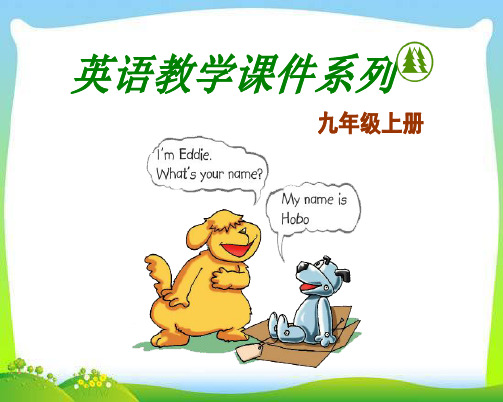
备注:见视频 Reading A
Reading
A What should I do?
Millie and Simon have some problems. They wrote to Mr Sigmund Friend, a famous youth worker, and asked for some advice. Here are their letters.
Simon Luo
Summary(1)
Millie stay awake It is hard to __________the next day. Problems hardly has spare time She ____________________ for her hobbies.
Is it bad to stay out late to play football? Should I spend less time on it? I wonder how I can achieve a balance between my schoolwork and my hobbies. I look forward to your valuable advice. Best wishes,
Free talk
1. Do you have any hobbies ?What ? 2. Do you have enough time for your hobbies? Why? 3. Do you have any teenage problems? 4. Which is your biggest problem? 5. who will you talk to about your problems?
牛津9B Unit 3 Reading 1 教案
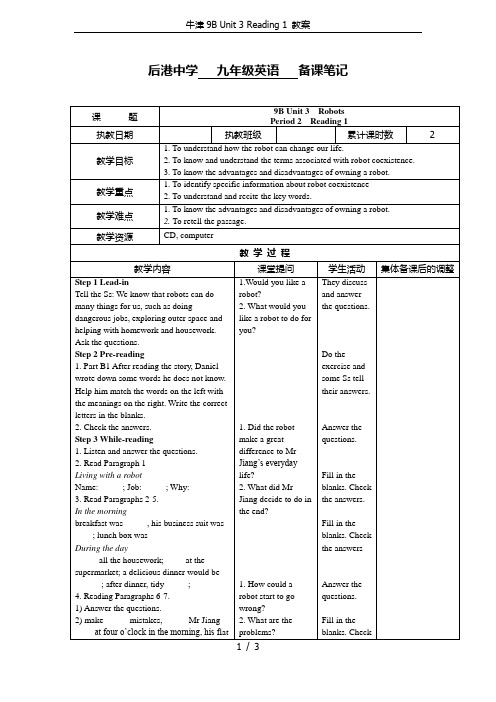
集体备课后的调整
____,coins, bills, and his private papers were _____,______ the things over.
Step 4 Post-reading
1. Part B2Daniel is thinking of the good and bad points of having a robot. Help him complete the lists below.
2. Check the answers.
Step 3 While-reading
1. Listen and answer the questions.
2. Read Paragraph1
Living with a robot
Name: _____; Job: _____; Why:____
3. Read Paragraphs 2-5.
1. How could a robot start to go wrong?
2. What are theproblems?
They discuss and answer
the questions.
Do the exercise and some Ss tell their answers.
Answer the questions.
Fill in the blanks. Check the answers.
Fill in the blanks. Check the answers
Answer the questions.
Fill in the blanks. Checkthe answers
后港中学九年级英语备课笔记
(完整版)译林牛津英语九年级下册9B第三单元Unit3Robots详细要点解析
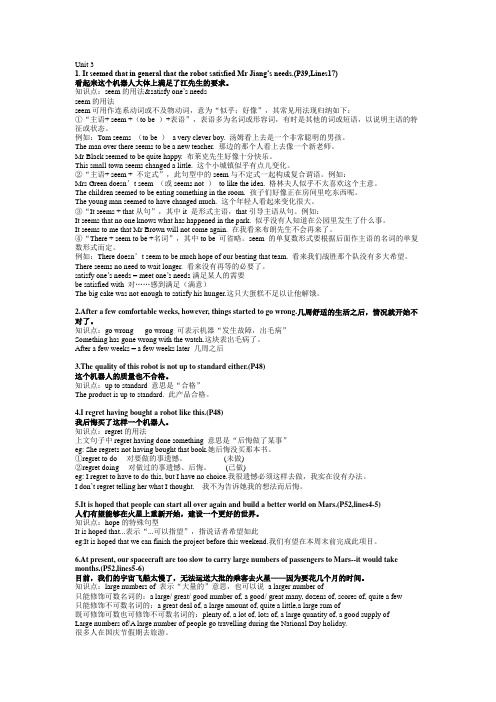
Unit 31. It seemed that in general that the robot satisfied Mr Jiang’s needs.(P39,Lines17)看起来这个机器人大体上满足了江先生的要求。
知识点:seem的用法&satisfy one’s needsseem的用法seem可用作连系动词或不及物动词,意为“似乎;好像”,其常见用法现归纳如下:①“主语+ seem +(to be )+表语”,表语多为名词或形容词,有时是其他的词或短语,以说明主语的特征或状态。
例如:Tom seems (to be ) a very clever boy. 汤姆看上去是一个非常聪明的男孩。
The man over there seems to be a new teacher. 那边的那个人看上去像一个新老师。
Mr Black seemed to be quite happy. 布莱克先生好像十分快乐。
This small town seems changed a little. 这个小城镇似乎有点儿变化。
②“主语+ seem + 不定式”,此句型中的seem与不定式一起构成复合谓语。
例如:Mrs Green doesn’t seem (或seems not )to like the idea. 格林夫人似乎不太喜欢这个主意。
The children seemed to be eating something in the room. 孩子们好像正在房间里吃东西呢。
The young man seemed to have changed much. 这个年轻人看起来变化很大。
③“It seems + that从句”,其中it 是形式主语,that引导主语从句。
例如:It seems that no one knows what has happened in the park. 似乎没有人知道在公园里发生了什么事。
牛津译林九年级下册9BUnit3-Unit4词汇知识点讲解

牛津译林九年级下册9BUnit3-Unit4词汇知识点讲解【知识梳理】plain动词 ------complaint名词(P36)一封投诉信 a complaint letter向某人抱怨 complain to sb埋怨某事(人) complain about sth.(sb).向某人抱怨某事 complain about sth/sb to sb他从来不为痛苦抱怨。
He never ______________ the pain.e.g.我们向警察投诉来自聚会的吵闹声。
We complained to the police about the noise from the party.complain that +从句e.g. 一些学生抱怨考试太难。
Some (of the) students complained that the exam was too hard/difficult.complaint n.不可数名词“抱怨”;可数名词“抱怨的行动或话,投诉”2.post,动(过,过分)posted, posted (P36)名词,邮寄、邮件名词,职位post the letter for sb= post sb the letter 这张卡片是一周前从伦敦寄出来的。
This card _________ from London a week ago.3.I don’t know when I’ll post the letter for you. (P36)注意同义句转换,简单句变复合句= I don’t know when to post the letter for you.Eg.I saw that he was reading the book carefully.=I saw him reading the book carefully.I know how I should drive a car.=I know how to drive a car.4.They could do dangerous jobs like putting out fires or working on high buildings. (P 37) 关于put的其他词组:put out 扑灭 put up 举起,张贴,悬挂,搭建 put on 穿上,上演put away 收拾,整理 put off 推迟 put in安装5.He is always too busy to have any time to relax.too...to 太...而不能做某事=He isn’t free enough to have any time to relax.=He is so busy that he doesn’t have any time to re lax.6.I have to buy a robot so that I can have more free time. (P38)so that 为了,表示目的,引导目的状语从句so...that... 如此,以至于,引导结果状语从句同义句转换=I have to buy a robot in order to have more free time.Eg.He is so clever that he gets high marks in exams.=He is such a clever boy that he gets high marks in exams.7.The robot made Mr Jiang’s life much easier. (P38)make + 名词+形容词,在此形容词做宾补。
Unit 3 Reading 知识点整理 牛津译林版英语九年级上册讲义 (含答案)

9AU3Reading【知识梳理1】I have a problem, and I do not know how I should deal with it.(P36)我有一个难题,而且我不知道应该怎样处理它。
deal,不及物动词,意为“处理”。
deal with意为“处理应付”。
When I worked in Florida I dealt with tourists all the time.我在佛罗里达州工作时一直和游客打交道。
[辨析]deal with,do withdeal with意为“处置,处理",因为deal是不及物动词,所以常与疑问词how连用;do with也意为“处置,处理”,因为do是及物动词,常与疑问词what连用,what 作do的宾语。
[经典例题](1)Mr Jiang didn't know ________ to do with his robot and I don't know ________ to deal with my pet.A.how; how B.what; how C.what; what D.how; what(2)I have a problem but I don’t know________to solve it.A.howB.whatC.whereD.when(3)It took me almost a whole day to________so many emails.A.run outB.cut inC.cheer forD.deal with(4)—Jim feels stressed from time to time, but he doesn’t know ______ about it.—He can get help from his teachers.A. Who to talkB. which to talk toC. when to talk toD. who to talk to答案:BADD【知识梳理2】I have a lot of homework every day, and I have no choice but to do it.(P36)我每天有许多家庭作业,我除了做它之外别无选择。
牛津英语9B Unit3 Reading
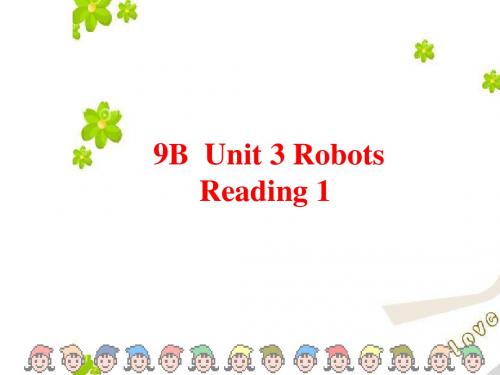
Part 3( Para.5):
What would Mr Jiang find when he got home?
He would find his flat in a complete mess. Food was laid on the bed. Milk was stored in the rubbish bin.
Coins, bills and his private papers were spread all over the floor.
Part 3& 4 ( Para.2-5): Complete the lists of Good points: Bad points: good and bad 1 With points the robot’s help, I points. 1 If the Robot catches
Reading
Part 4 (Para.6):Choose the right answer.
How did Mr Jiang deal with the problem at last?
A. He threw it away. B. He fixed it by himself.
C. He returned it to the robot shop.
Reading Part 2( Para.2-4): Fill in the form.
In the morning
What did the robot do? What did Mr Jiang do?
made __________ breakfast When he got up in the ironed his business suit morning, everything was _________ ready. prepared a lunch box _________
牛津上海版九年级教学上册Unit3知识点总结
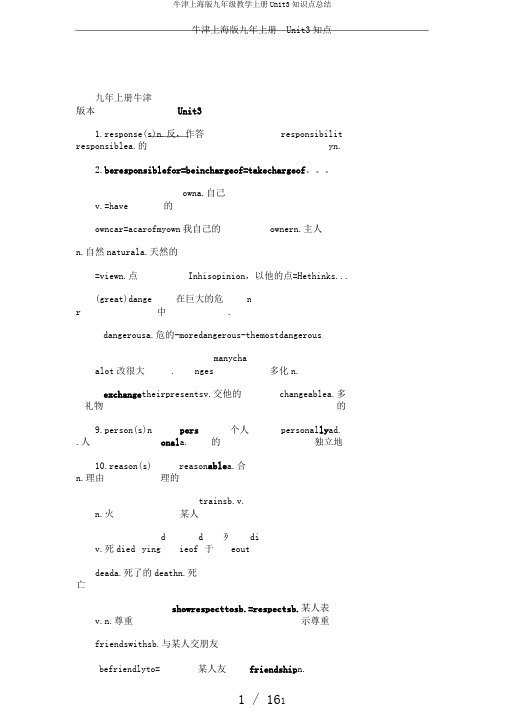
牛津上海版九年上册Unit3知点九年上册牛津版本Unit31.response(s)n.反,作答responsiblea.的responsibilityn.2.beresponsiblefor=beinchargeof=takechargeof。
v.=have有owna.自己的owncar=acarofmyown我自己的ownern.主人n.自然naturala.天然的=viewn.点Inhisopinion,以他的点=Hethinks...(great)dange r在巨大的危中n.dangerousa.危的-moredangerous-themostdangerousalot改很大.manychanges多化n.exchange theirpresentsv.交他的礼物changeablea.多的9.person(s)n .人personal a.个人的personal ly ad.独立地10.reason(s) n.理由reason able a.合理的n.火trainsb.v.某人v.死dieddyingdieof死于dieoutdeada.死了的deathn.死亡v.n.尊重showrespecttosb.=respectsb.某人表示尊重friendswithsb.与某人交朋友befriendlyto=某人友friendship n.bekindto好的友v.咬hide-hid-hiddenv.藏v.choicen.高的a.unhappy不高a.happil y 高地ad.happiness幸福n.不健康unusual不常的unlucky不幸运的unnecessary不重要的a.有空的,免的,自由的free dom n.自由1.expense(s)n.用collegeexpenses大学用(high/low) expensivea.昂的moreexpensive-themostexpensiven.信心,信任havefaithin⋯有信念faithful忠的a.faithfully忠地ad.3.extremely=very/quite=terribly= completelyad.非常sb.v.使某人惊tooursurprisen.使我惊的是5.surprising/amazingn ewsa.令人异的消息6.besurprised/ama zedata.。
牛津版九年级下册9BUnit3 Reading1
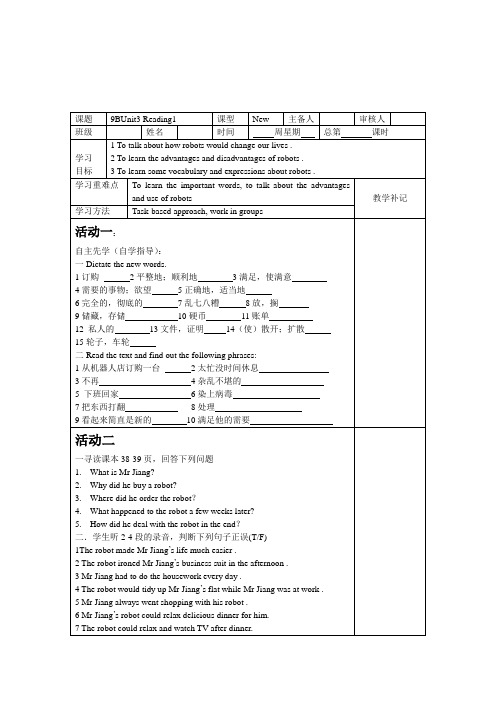
自主先学(自学指导):
一Dictate the new words.
1订购2平整地;顺利地3满足,使满意
4需要的事物;欲望5正确地,适当地
6完全的,彻底的7乱七八糟8放,搁
9储藏,存储10硬币11账单
12私人的13文件,证明14(使)散开;扩散
15轮子,车轮
二Dictate the following phrases:
1从机器人店订购一台___2太忙没时间休息__
3不再______4杂乱不堪的__
5下班回家_____6染上病毒
7把东西打翻____8处理
9看起来简直是新的10满足他的需要_______
活动二
一寻读课本38-39页,回答下列问题
1.What is Mr Jiang?
2.Why did he buy a robot?
C that we couldn’t hear him clear D.because we couldn’t hear him clear
()5 The Cleaners should not be looked down on and they are angels of the city ___________.
It seemed that______________________ the robot.
4后来机器人感染了病毒,再也不能正确的工作了。
Later ,the robotand.
5他的西装是他的机器人熨烫的,看上去像新的一样。
His business suit isand looks.
二单项选择
( ) 1 I don’t know what to dothe broken computer .
沪教牛津版初中英语九年级下册Unit 3知识点梳理

沪教牛津版初中英语九年级下册Unit 3知识点梳理Unit3单词concern[kən'sɜːn] 担心;忧虑n.atmosphere ['ætməsfɪə] 大气层n.temperature [temprətʃə(r)] 温度;气温n.consumer [kən'sjuːmə] 消费者n.guess [ges] 猜测v.green [griːn] 环境保护的;赞成环境保护的v.lifeless ['laɪflɪs] 无生命的;无生物生长的adj.fuel [fjʊəl] 燃料n.coal [kəʊl] 煤n.result [rɪ'zʌlt] 结果n.increase [ɪn'kriːs] ['ɪn] (使)增长;增多v.sea level ['lev(ə)l] 海平面n.destroy [dɪ'strɒɪ] 摧毁;毁灭v.nature ['neɪtʃə] 自然界;大自然n.surface ['sɜːfɪs] 表面;表层n.soil [sɒɪl] 土壤n.flood [flʌd] 洪水;水灾n.habit ['hæbɪt] 习惯n.proper ['prɒpə] 正确的;恰当的adj.friendly ['fren(d)lɪ] 无害的adj.recycle [riː'saɪk(ə)l] 回收利用v.purpose ['pɜːpəs] 目的;用途n.solution [sə'luːʃ(ə)n] 解决办法;处理手段n.government ['ɡʌvɚnmənt] 政府n.role model ['mɒdl] 楷模;行为榜样n.greenhouse effect 温室效应in danger 在危险中as a result of 由于result in 造成;导致mountains of 许多;大量take action 采取行动make a difference 有作用;有影响act as 充当Unit3课文The world is in danger世界正处于危险之中Our world is in danger.We must do something to protect the environment.But, what are the main problems we face?我们的世界正处于危险之中。
牛津上海英语九年级上册 Unit3reading(共33张PPT)

1. Why is a person lucky to see a female Ghost Fish? (Paragraph. 2)
2. What is special about the African ghost fish? (Paragraph. 2)
They need (3) n______ food.
The female is the (4) m_______ b________ creature alive. She becomes (5) v_____(看得见的)after she (6) l_______ her eggs.
All customers will be completely (7) s______.(满意的) The fish will give hours of (8) p_______(乐趣) to you and to your (9) f______. Buy now before they are all sold (10) o__ !
whisper
A. The African Ghost Fish
What do you know about fish? Say whether each statement below is T or F. (P66/Ex.A1)
F 1. Fish cannot sleep. T 2. Fish can feel pain. T 3. Some fish catch insects for food. F 4. Some fish talk. T 5. Dolphins and whales are not fish.
牛津译林版9B英语Unit 3 Robots Reading I 课件

Translate them into English.
总的来说 满足某人的需要 出错 不再 犯愚蠢的错误 完全乱七八糟 被放在… 被散落一地 撞翻
决定退回… 帮助人们很多 许多麻烦
Homework
1 Read the passage aloud. 2 Finish the exercises.
(line 22)
designed to cause
6 store (line 23)
computers problems
____c___ f. provide what is needed
Task 1: Skim the text 快速浏览全文
Divide the passage into 4 parts.
What did the robot do? What did Mr.
Jiang do?
Do all the __h_o_u_s_e_w_o_r_k__,
_G__o_s_h_o_p_p__in_g___ at the supermarket
Work
Para4: In the evening
What did the robot do? What did Mr Jiang do?
sweep the floor
explore outer space
play football
look after patients
show visitors around interesting places
serve us at restaurants
put out the fires
Good points
1 With the robot’s help, I will have a lot more time to __r_e_la_x_____. 2 It can make _b_r_e_a_k_fa_s_t_for me in the morning. 3 It can __i_ro_n____ my clothes. 4 It can __g_o_s_h_o_p_p_i_n_g_at the supermarket if I am busy. 5 It can __t_id_y__u_p____ after diner. 6 My flat will look __a_s_g_o_o_d_a_s__n_e_w____.
牛津译林版英语9B Unit3 重点词组
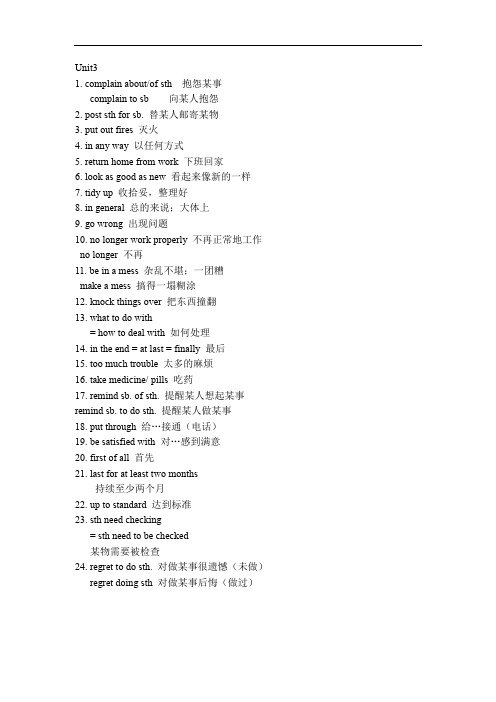
Unit31. complain about/of sth 抱怨某事complain to sb 向某人抱怨2. post sth for sb. 替某人邮寄某物3. put out fires 灭火4. in any way 以任何方式5. return home from work 下班回家6. look as good as new 看起来像新的一样7. tidy up 收拾妥,整理好8. in general 总的来说;大体上9. go wrong 出现问题10. no longer work properly 不再正常地工作no longer 不再11. be in a mess 杂乱不堪;一团糟make a mess 搞得一塌糊涂12. knock things over 把东西撞翻13. what to do with= how to deal with 如何处理14. in the end = at last = finally 最后15. too much trouble 太多的麻烦16. take medicine/ pills 吃药17. remind sb. of sth. 提醒某人想起某事remind sb. to do sth. 提醒某人做某事18. put through 给…接通(电话)19. be satisfied with 对…感到满意20. first of all 首先21. last for at least two months持续至少两个月22. up to standard 达到标准23. sth need checking= sth need to be checked某物需要被检查24. regret to do sth. 对做某事很遗憾(未做)regret doing sth 对做某事后悔(做过)。
苏教版牛津英语9B Unit3知识总结

9B Unit3 Robots重要单词1.proper ly adv.正确地,适当地proper adj. 正确的,适当的(right, correct)work properly 正确地运行wear clothes properly 恰当地穿衣服in a proper way 以正确的方式You aren’t wearing proper clothes for this hot weather.What’s the proper way to greet people there?2.private adj. 私人的in private 私下里反in public 公开地a private plane 一架私人飞机a private school/a public school私立/公办学校3.paper un. 纸 a piece of paper 一张纸cn. 报纸;文件,证明;试卷an evening paper 一份晚报private papers 私人文件4.spread v.(使)散开;扩散,传播spread, spreadn. 扩散,分布,展开What can we do to prevent the spread of the disease?They spread some newspapers on the ground. 他们在地上铺了几张报纸。
重要词组up to standard 达到标准work on high buildings在高楼上工作be at work在工作post sb. sth. = post sth. for sb. 为某人寄某物make one’s life much easier使某人的生活轻松得多be ready for为…做好准备return home from work下班回家tidy up收拾妥当,整理好do some reading做一些阅读return sth to sb.把某物还给某人make stupid mistakes犯愚蠢的错误have a poor memory记忆力差go on a business trip出差;进行一次商务旅行have a better sleep有更好的睡眠have a serious heart problem有严重的心脏问题take medicine/take pills 服药go up and down the steps often经常上下楼梯expect sb. to do sth. 期待某人做某事change the batteries every two months 每两个月换电池三、重点句型1.I’m complaining about you to the robot shop.complaint un.抱怨,发牢骚,投诉cn.感到不满的事,抱怨的行动或话语complain about sth to sb.向某人抱怨某事complain about/of sth. 抱怨某事a complaint letter 一封投诉信There’s no real reason for complaint. 没有真正抱怨的理由。
牛津英语9B Unit 3
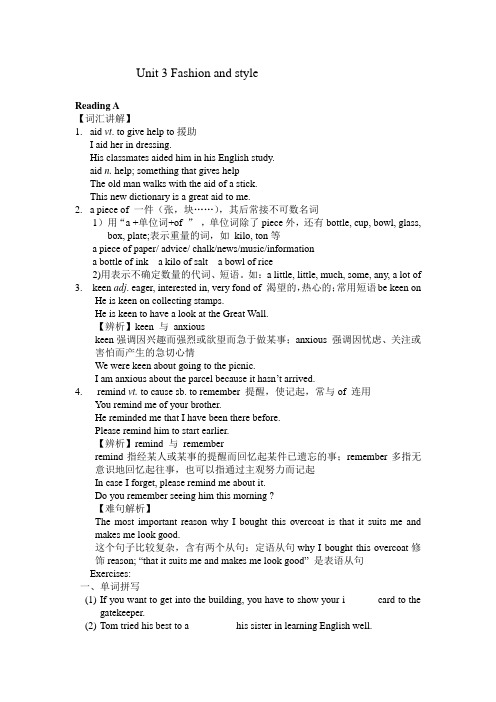
Unit 3 Fashion and styleReading A【词汇讲解】1.aid vt. to give help to援助I aid her in dressing.His classmates aided him in his English study.aid n. help; something that gives helpThe old man walks with the aid of a stick.This new dictionary is a great aid to me.2. a piece of 一件(张,块……),其后常接不可数名词1)用“a +单位词+of ”,单位词除了piece外,还有bottle, cup, bowl, glass, box, plate;表示重量的词,如kilo, ton等a piece of paper/ advice/ chalk/news/music/informationa bottle of ink a kilo of salt a bowl of rice2)用表示不确定数量的代词、短语。
如:a little, little, much, some, any, a lot of3. keen adj. eager, interested in, very fond of 渴望的,热心的;常用短语be keen onHe is keen on collecting stamps.He is keen to have a look at the Great Wall.【辨析】keen 与anxiouskeen强调因兴趣而强烈或欲望而急于做某事;anxious 强调因忧虑、关注或害怕而产生的急切心情We were keen about going to the picnic.I am anxious about the parcel because it hasn‟t arrived.4. remind vt. to cause sb. to remember 提醒,使记起,常与of 连用You remind me of your brother.He reminded me that I have been there before.Please remind him to start earlier.【辨析】remind 与rememberremind指经某人或某事的提醒而回忆起某件已遗忘的事;remember多指无意识地回忆起往事,也可以指通过主观努力而记起In case I forget, please remind me about it.Do you remember seeing him this morning ?【难句解析】The most important reason why I bought this overcoat is that it suits me and makes me look good.这个句子比较复杂,含有两个从句:定语从句why I bought this overcoat修饰reason; “that it suits me and makes me look good”是表语从句Exercises:一、单词拼写(1)If you want to get into the building, you have to show your i______ card to thegatekeeper.(2)Tom tried his best to a_________ his sister in learning English well.(3)Put on your o________ before you go out, because it‟s cold outside.(4)The old computer in our school have been r________ with new ones.(5)Women had little s_________ in Old China ,while men decided almosteverything.(6)If you keep on being late, you‟ll be f__________.二、单项选择(1)The bridge over this river ________ stone.A.was made ofB.was made fromC.is made ofD.is made from(2)The little boy spent the whole afternoon _________ games.A.to playB.playedC.on playingD.playing(3)_______ to music can make you _________ relaxed.A.Listening, feelB.Listen, to feelC.Listening, to feelD.Listen, feel(4) Tea is one of _________ in China.A.popular drinkB.more popular drinksC.most popular drinksD.the most popular drinks(5)-May I speak to Peter, please?-Sorry, I am afraid he is not here.He has gone to Shanghai ___________.A.by businessB.on businessC.with businessD.of business三、完成句子(1) 这款手机已经过时了。
牛津译林版九年级英语下册9B Unit3 单词讲义

9B Unit3单词讲义1.robot n. 机器人( a machine that works under the control of computers)a robot show机器人展complain about you to the robot shop向机器人商店投诉你2. post v. 邮寄 = mail (美)post the letter for me 为我寄这封信a post office 邮局by post3. explore v. 探索;探讨explore outer space 探索太空explore r n. 探险者an explorer4. brain n.大脑 a clever brain She’s got a good brain.她头脑很管用。
5. whatever pron.任何,一切事物They could do whatever they are asked to.That allowed Mr. Jiang to do whatever he liked. They eat whatever they can find in the kitchen. 他们在厨房里找到什么就吃什么。
whenever; wherever; whoever; however6. order v. 订购order a robot from a robot shop从机器人商店订购一个机器人v. 命令order sb. (not) to do sth.点(饭菜等)order a pizzan. 命令receive an order订单You need to pay more attention to your orders.顺序in a fixed order; keep…in order6. suit n .套装his business suit 西装v. 适合Will the colour suit you?这个颜色适合你吗?7. smooth ly adv.平整地;顺利地be ironed smoothly 被烫得平平整整The pen writes smoothly.smooth 平整的;平坦的;光滑的The road is not smooth.Jane’s silk blouse feels far (光滑)than the cotton one.8. iron v. 熨烫(make clothes smooth with an iron) iron shirts 熨衬衫need ironing = need to be ironed 需要被熨烫His business suit needs _________. (iron)He always ________ his shirts every morning before going to work.n. 熨斗,铁Strike while the iron is hot.趁热打铁。
《牛津初中英语》9B Unit 3 AsiaReading
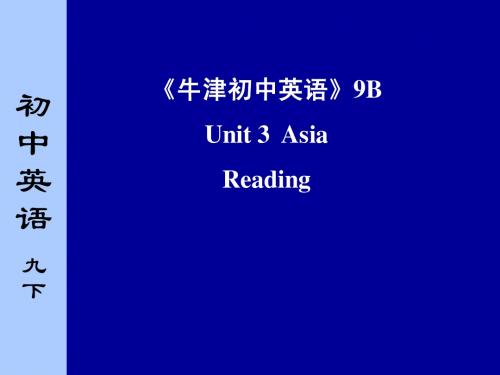
3.情感目标
通过对北京和桂林的了解,引导学生体 验祖国河山的美丽,培养学生热爱祖国的
情操。
ቤተ መጻሕፍቲ ባይዱ
初 中 英 语
九 下
五、教学重难点 理解和掌握下列句型: Unless you have a map, you will get lost easily. The emperors of the Ming and Qing dynasties used to live here. …, so that they can watch the … It is the biggest square in the world and is always filled with tourists. It lies on the two sides of Li River.
初 中 英 语
九 下
Finishing the exercises on page 44 and page 45 Keys
B 1b 2e 3d 4c 5a C 1 palace 2 dynasties 3 museum 4 raising 5 gather 6 mountains E 1c 2a 3c 4c 5c 6a
初 中 英 语
九 下
小结
今天我们学习了有关中国的两
个城市北京和桂林的文章,了解了 北京和桂林的一些著名景点,还学 习了描述这些景点的词汇和句型。 希望同学们回去后能复习今天所学 的内容,尝试着用英语向朋友介绍 这两个城市。
初 中 英 语
九 下
Homework
1 Copy the new words and expressions.
Task Three Further reading
初 中 英 语
- 1、下载文档前请自行甄别文档内容的完整性,平台不提供额外的编辑、内容补充、找答案等附加服务。
- 2、"仅部分预览"的文档,不可在线预览部分如存在完整性等问题,可反馈申请退款(可完整预览的文档不适用该条件!)。
- 3、如文档侵犯您的权益,请联系客服反馈,我们会尽快为您处理(人工客服工作时间:9:00-18:30)。
老师手里拿着教鞭从座位上站起来。
④ His book has risen in value, and he has risen in rank.
他写的书升值了,他也随着升级了。
【注】raise和rise有时可用来描述同一事情,但含义有所不同。试比较:
① The price of tomatoes has been raised recently.
③ People were filled with pleasure at the news. 听了这个消息,人们心中充满了喜悦。
★full是形容词,意思是“满的”“充满的”。Be full of = be filled with,都表示状态,但介词搭配不一样。如:
① The bag is full of (或filled with) books. 包里装满了书。
最近西红柿的价格上涨了。(价格的上涨可能是由于政府或其他方面的原因)
② The price of tomatoes has risen recently. 西红柿最近涨价了。(说明价格自身上涨)
③ Our living standard has risen in the past few years.
★lie用作动词,意为“位于”“坐落于”,其过去式为lay,过去分词为lain。如:
Japan lies to the east of China. 日本位于中国的东面。
⑥ He lifted the child up from the ground. (强调用劲儿扶起)
19. It is a famous Chinese-style garden built in a natural landscape.
这是一座建在自然风光基础之上的著名的中国式的园林建筑群落。
它是一条绵延5000千米横贯中国北部的城墙。
★run用作不及物动词,意为“延伸”“通往”“延续”“继续”。如:
① The road runs for many miles by the sea. 这条公路沿着海边延伸好几英里。
② A small stream runs across it. 一条小溪从这里穿过。
② We mustn’t enter the forbidden zone. 我们不能进入禁区。
★forbid作动词,有“禁止”“不准”“妨碍”的意思。它的过去式和过去分词是forbade和forbidden。如:
① Photography is strictly forbidden in the museum. 博物馆内严禁摄影。
明朝和清朝的皇帝过去常常住在这里。
★used to do表示“过去常常做某事”,言外之意就是现在已不是如此,因此没有现在时,后面总是跟不定式。如:
① It used to be a very rich village. 这个村子以前很富。
★be used to +名词或动名词表示“习惯于某事或做某事”,这里to为介词,后面的动词须用-ing形式。如:
人民的生活水平有了很大提高。
★rise (rose, risen)用作不及物动词,意为“上升”“升起”“增长”“提高”“起身”。作“上升”讲时是指继续上升,常用于日、月、云、雾、烟、水蒸气等;也可以指温度计、体温、物体、水位、职位等方面的上升。如:
① Look! The moon is rising. 瞧!月亮升起来了。
③ The United Kingdom consists of Great Britain and Northern Ireland.
联合王国由大不列颠与北爱尔兰两部分组成。
3. It is a long wall which runs more than 5,000 kilometers across northern China.
★famous用作形容词,意为“著名的”“出名的”“值得注意的”。如:
★be famous for意为“以……而出名”,其主语可以是人也可以是物,for后的宾语说明出名的原因。如:
① The area is famous for its green tea. 这个地区以绿茶而出名。
9B unit3 reading
At the centre of Beijing is the Forbidden City. 紫禁城位于北京市中心。
★forbidden主要用作形容词,意思为“被禁止的、禁用的”。如:
① Parking forbidden. 禁止停车。
② She has had a high fever, and her temperature is still rising. 她发高烧,体温还在上升。
③ The master rose from his chair with the teaching stick in his hand.
它(天安门广场)是世界上最大的广场,并总是挤满了游客。
★fill是动词,意思是“(使)充满”“(使)装满”,表示一个动作。如:
① Please fill the glass with water. 请把杯子注满水。
② He filled the bag with clothes. 他把包装满衣服。
★fill也可表示一个状态,相当于be filled with,但表达形式不同,请注意下面的表达法。
① Smoke filled the room. = The room was filled with smoke. 房间里浓烟弥漫。
② Tears filled her eyes. = Her eyes were filled with tears. 她眼睛里充满了泪水。
② Smoking is forbidden here. 这里禁止抽烟。
③ My father forbade me to watch television. = My father forbade my watching television.
我父亲不准我看电视。
The emperors of the Ming and Qing dynasties used to live here.
★be used to do表示“被用来做某事”,这里be used是被动语态,后面接不定式。如:
① This room is used to store rice. 这间屋是用来存放稻谷的。
It is the biggest square in the world and is always filled with tourists.
★
★run用作不及物动词,意为“流”。如:
① The Huanghe River runs into the sea in North Shandong.
黄河在山东北部入海。
★run同作及物动词,意为“经营”“管理”“开动”。如:
It lies on the two sides of the River Li. 它(桂林)座落于漓江两边。
每天,他们中有许多人在太阳升起的时候聚集在这里看升国旗。
★gather用作动词,意为“集合”“聚集”“……靠拢”。如:
① Thousands of people gathered for the rock concert.
数以千计的群众聚集起来听摇滚音乐会。
raise与rise的用法
颐和园由万寿山和昆明湖(人工湖)构成主体框架,里面亭台楼阁、殿堂厅室、塔航桥关,应有尽有。
★consist of意为“由……组成”“由……构成”。如:
① The book consists of eight chapters. 那书共有八章。
② Water consists of hydrogen and oxygen. 水由氢和氧组成。
Our living standard has been raised in the past few years.
近几年来,我们的生活水平提高了。
④ He raised the child from the ground. (强调把孩子扶起来)
⑤ The child rose from the ground. (强调孩子自己站起来)
I’m used to dealing with matters of this kind. 我已习惯于处理这类事。
① You’ll get used to that in time. 你很快就会对此习惯的。
② I’ve become used to such food. 我已习惯吃这样的食品。
② France is famous for its fine food and wine. 法国以其佳肴和美酒而闻名。
★be famous as意为“以某种身份而闻名、出名”,as后的宾语与主语是同位成分。如:
① Einstein was famous as a great scientist. 爱因斯坦以一位伟大的科学家著称。
★raise (raised, raised)作及物动词,表示“抚养”“养育”;raise还有“饲养”“喂养”“种植”“提出”“举起”“抬起”“提高”的意思。如:
① The old lady raised six orphans in her life. 这位老太太一生抚养了六个孤儿。
② Where was he raised? 他是在哪里长大的?
③ His job is to raise pigs. 他的工作就是养猪。
④ She raised her eyes and stared at them. 她举目盯着他们。
⑤ The people’s living standards have been is homework was full of (或filled with ) mistakes. 他的作业里都是错。
